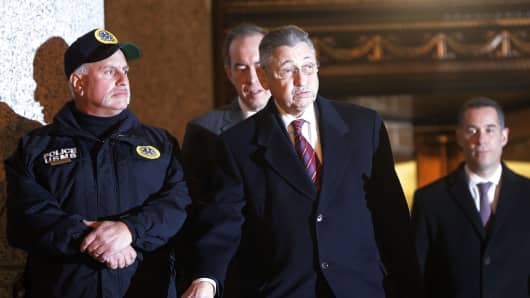Last month, for example, a state appeals panel ordered that former Penn State assistant football coach Jerry Sandusky, sentenced to prison three years ago on child molestation convictions, should continue to get his $4,900-a-month state pension because he wasn't a Penn State employee when he committed the crimes that prompted state officials to revoke his pension.
"We find that nothing in the record in any way establishes that Mr. Sandusky was a (Penn State) employee when the underlying criminal acts were committed," the court found.
Sandusky, now 71, got a $148,000 lump sum payment when he retired in 1999 and monthly payments of $4,900, which stopped in 2012 when he was sentenced to 30 to 60 years in prison for sexually abusing 10 children, according to the Associated Press. In addition to reinstating his pension, the court said Sandusky is owed those missed monthly payments — plus interest.
With millions of Americans worried about their own retirement savings, taxpayer-funded pensions are also helping to support federal officials serving time in prison.
Read More Despite tax hike, Chicago still faces huge pension fund gap
A dozen federal lawmakers convicted of crimes are collecting more than $700,000 a year in federally funded pensions, according to the Taxpayers Union, a citizen watchdog group.
In 2007 and again in 2012, Congress tightened pension forfeiture laws for its members convicted of crimes relating to their service.
But that doesn't apply to all convictions.
In October, former U.S. House Speaker J. Dennis Hastert pleaded guilty to evading banking laws in a hush-money scheme in a deal with prosecutors that spared him a trial limited his prison term to no more than six months.
While the conviction prompted the removal of his portrait from the hallway outside the House chamber, he will still collect his pension, estimated at more than $70,000 per year, according to Roll Call. That's because the crimes included in Hastert's plead guilty took place after he left Congress.
Federal law governing pension forfeiture contains an even bigger loophole, according to National Taxpayers Union President Pete Sepp, that allows for a "hardship exemption" if the loss of a pension could create a financial burden for his or her pension family.
Some state pension forfeiture laws also include grandfather clauses that exempt the legislators who enacted them. New York lawmakers passed the state's current forfeiture law in 2011, but it only covers public officials elected after it was passed.
Voter backlash to paying public pensions to convicted lawmakers has prompted renewed calls for reform.
In October, New Mexico's Republican Secretary of State Dianna Duran, charged with violating campaign finance laws, pleaded guilty in a deal that is expected to spare her jail time and let her keep her pension. Last month, Democratic leaders in the state's legislature unveiled a proposal for a statewide ethics commission and tougher pension forfeiture law aimed at corrupt elected officials.
Generating political support isn't the only hurdle facing those who want tougher measures to cut off pensions to lawmakers in prison. These laws are only as tough as the people enforcing them, Sepp said.
"There are conscientious lawmakers who want to make this right," he said. "Many of these if, ands and buts mean a great deal with the law actually has to be applied."



